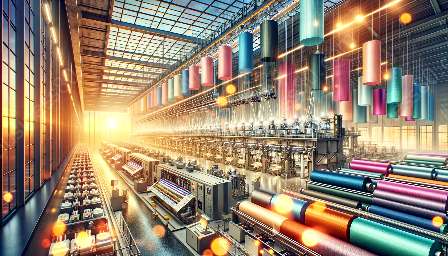Yarn strength is a crucial aspect in the manufacturing of textiles and nonwovens, impacting the quality and durability of the end products. Understanding the factors affecting yarn strength is essential for producing high-quality fabrics.
The Importance of Yarn Strength in Textiles and Nonwovens
Yarn strength plays a critical role in determining the overall performance and longevity of textiles and nonwovens. It affects the fabric's tensile strength, resistance to abrasion, and ability to withstand various stress factors during use.
Factors Affecting Yarn Strength
Several factors influence the strength of yarn, including fiber type, yarn structure, spinning process, and yarn finishing.
- Fiber Type: Different types of fibers have varying inherent strength properties. Natural fibers such as cotton and wool have different strength characteristics compared to synthetic fibers like polyester and nylon.
- Yarn Structure: The structure of the yarn, such as the twist level and the arrangement of fibers within the yarn, can significantly impact its strength.
- Spinning Process: The method used to spin the fibers into yarn, such as ring spinning or open-end spinning, affects the yarn's strength and consistency.
- Yarn Finishing: The finishing processes, including treatments for smoothing or modifying the yarn surface, can affect its strength and abrasion resistance.
Testing and Measurement of Yarn Strength
Yarn strength is measured using standardized testing methods such as the single yarn tensile test, which evaluates the breaking strength and elongation properties of the yarn. Manufacturers use specialized equipment to ensure that yarn meets the required strength specifications for different applications.
Application in Yarn Manufacturing
Understanding yarn strength is essential for yarn manufacturers to produce yarns that meet the specific requirements of textile and nonwoven applications. By controlling the factors influencing yarn strength, manufacturers can optimize the performance and durability of their products.
Enhancing Yarn Strength for High-Performance Applications
For technical textiles and high-performance nonwovens, such as those used in protective clothing, geotextiles, and filtration media, achieving superior yarn strength is imperative. Specialized fibers and advanced spinning technologies are employed to create yarns with exceptional strength and durability.
Quality Control and Assurance
Quality control measures are implemented throughout the yarn manufacturing process to ensure consistent yarn strength and overall product quality. These measures include regular testing, monitoring process parameters, and implementing corrective actions to maintain the desired yarn strength levels.
Impact on End Products
The yarn strength directly influences the quality, performance, and longevity of the end products. Fabrics and nonwoven materials with higher yarn strength exhibit improved resistance to tearing, breaking, and abrasion, contributing to enhanced product reliability and customer satisfaction.
Innovation and Future Trends
Research and development in yarn manufacturing continue to focus on enhancing yarn strength through advanced materials, innovative spinning techniques, and sustainable practices. The future trends in yarn strength aim to address the evolving needs of diverse industries and applications, including sustainable textile production and smart textiles.
Understanding and optimizing yarn strength is essential for ensuring the production of high-quality textiles and nonwovens that meet the demands of various industries and applications.

